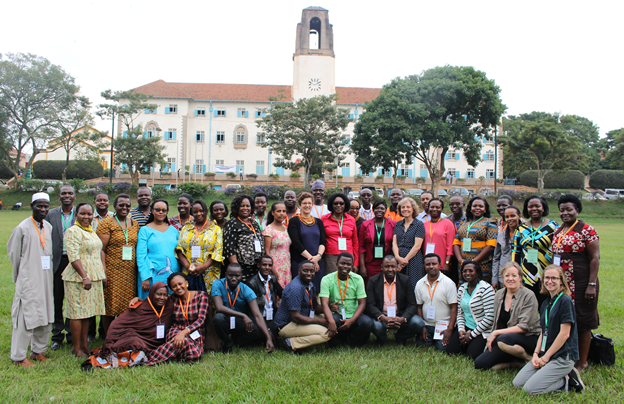This article originally appeared on the Makerere University website.
Makerere University’s Gender responsive Researchers Equipped for Agricultural Transformation (GREAT) project on 5-6 August, 2020 held its 5th Annual meeting via the webinar to take stock of her achievements in Phase 1, reflect on lessons learnt and project into the future.
The project is in the final stages of wrapping up Phase 1 since its inception in 2015. The project ends in April 2021, with a possibility of a phase 2 in collaboration with other international agricultural players. The zoom meeting reviewed the progress of GREAT Year 5 and paved a way forward for the pending period and post-Phase 1.
The meeting brought together 16 and 45 participants on day 1 and 2 from various institutions active in the gender and agriculture ecosystem locally and globally.
Participants were drawn from: the CGIAR GENDER Platform; CGIAR Excellence in Breeding; CGIAR Gender & Breeding Initiative; African Women in Agricultural Research and Development (AWARD); LANDESA; Canada’s International Development Research Centre (IDRC); Oxford University; Bill & Melinda Gates Foundation; United States Agency for International Development (USAID); International Food Policy Research Institute (IFPRI); ALINe Impact, Makerere University and Cornell University .
Makerere University leadership was represented by the Vice Chancellor, Prof. Barnabas Nawangwe, the Principal, College of Agricultural and Environmental Sciences (CAES) Prof. Bernard Bashaasha and the Principal, College of Humanities and Social Sciences (CHUSS) Prof. Josephine Ahikire. Prof. Bashaasha and Prof. Ahikire are members of the Project External Advisory Committee (EPAC). Cornell leadership was represented by Prof. Max Pfeffer, the Executive Dean, College of Agriculture and Life Sciences.

In his remarks (video), the Vice Chancellor Prof. Barnabas Nawangwe welcomed all partners to the meeting and expressed gratitude that Makerere University was chosen to host and implement GREAT activities.
The Vice Chancellor informed members that the GREAT project’s mission was well aligned to the strategic plan and mandate of the University and congratulated the GREAT Project team upon the outstanding achievements in Phase 1.
Prof. Nawangwe applauded the Principal Investigators-Assoc. Prof. Margaret Najjingo Mangheni (Makerere University) and Dr Hale Ann Tufan (Cornell University), for their excellent leadership and thanked the Principals of CAES and CHUSS for nurturing this novel program saying the project has had outstanding impact in Sub-Saharan Africa and beyond.
Prof. Nawangwe underscored the importance of gender in agriculture, highlighting that it is at the centre of determining the destiny of many people in Uganda and Africa pledging the university’s continued support to the project in the subsequent phases.
Representing the funders Bill and Melinda Gates Foundation (BMGF), Ms Vicki Wilde congratulated the GREAT team upon the enormous achievement. She applauded the Co-PIs for the able leadership and for building smooth partnerships. “A huge shout out to the Makerere and Cornell teams! They are modeling how to build excellent partnerships. A huge shout out to the two different schools within Makerere [CAES and SWGS] for their partnership too. This all could have gone wrong… but you made it happen. So very proud of you!” said Ms Wilde.
The main objective of the project was to establish a Centre of Excellence for Gender and Agricultural Research and Training for Sub-Saharan Africa at Makerere University.
Makerere University Project Coordinator Assoc. Prof. Assoc. Prof. Margaret Najjingo Mangheni, said the project has developed and tested an effective capacity building model and trained 259 agricultural scientists from 51 institutions and 26 countries in Africa and beyond.
Through targeted recruitment, the project has equipped selected national agricultural research institutions with a critical mass of trained staff with potential to catalyze institutional transformation.
“The future of GREAT is bright. The University is poised to be a knowledge and training hub for gender responsive agricultural training and research in Sub-Saharan Africa ”, said Assoc. Prof. Margaret Najjingo Mangheni, the Co-PI at Makerere University.
The project has created a strong team of 13 faculty trainers and researchers at Makerere University across diverse units, established a vibrant network of researchers in gender and agriculture and fostered new institutional linkages between Makerere University and Cornell University.
In addition, the GREAT project has attracted more international collaborators such as the Innovation Lab for Crop Improvement program of Cornell University, the Accelerated Genetic Gain in Rice (AGGRi) Alliance of the International Rice Research Institute (IRRI), and the Innovation Lab for Peanut at the University of Georgia, USA.
Prof. Mangheni also said that before the end of phase one, the project will host a conference where fellows and trainers will share their gender-responsive research products; publish the research outputs in a special issue of the Agri-gender journal; and work with the University administration to streamline systems for spinoff courses such as advertising and finance.
About the author
For press inquiries or for more information, email us at great@cornell.edu.





